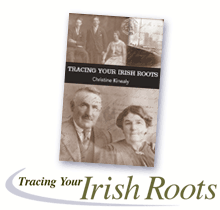 |
 | |||
 Christine Kinealy  Headings
If you have a little information about your family history (first and forenames, approximate dates and general area of birth), Genealogy in Ireland becomes less of an ordeal. Official records and church lists may aid you in your search. Irelandseye presents an 'Ireland Genealogy' course, extracted from Tracing Your Irish Roots by Christine Kinealy. Useful DepositoriesFrom the time of the Viking invasion of Ireland in the eighth century until the twentieth century, the administrative centre for the thirty-two counties of Ireland was Dublin. The Act of Union of 1800 (by which Ireland lost its own parliament in Dublin) shifted some administrative responsibility to London. Also as a consequence, the United Kingdom of Great Britain and Ireland was created. The partition of Ireland in 1921 changed the situation again. Six counties in the north east of Ireland (Antrim, Armagh, Derry, Down, Fermanagh and Tyrone) remained as part of the United Kingdom and the other twenty-six counties were constituted into the Irish Free State. As a result, the administrative centre for Northern Ireland became Belfast (and, ultimately, London) while Dublin continued as the administrative centre for the other twenty-six counties. After 1949, the Free State became known as the Republic of Ireland.For genealogists and family historians, the effects of the partition of Ireland can be confusing. After 1921, a Public Record Office and a Registrar-General's Office was established in Belfast, so records for an Irish ancestor might be located in Dublin or Belfast depending on place of origin, date of birth or death, and so on. Back to top In the final Irelandseye-exclusive extract from Tracing Your Irish Roots by Christine Kinealy, we continue to list valuable Republic Of Ireland Genealogy Record Depositories. Ireland Genealogy Record Depositories - Republic Of IrelandThe National ArchivesUntil 1988 this office was known as the Public Record Office of Ireland and it was situated at the Four Courts, Dublin. In 1988, the Public Record Office and the State Paper Office were amalgamated to form the National Archives. The original Public Record Office was destroyed by fire in 1922 during the Irish Civil War. However, despite the loss of many records, it continued to provide an excellent resource for the family historian. The most frequently consulted records were moved to the new offices in Bishop Street. Records from the State Paper Office in Dublin Castle were also moved to this location. Material of genealogical value to be found at the National Archives includes:
The Tithe Applotment Books and Griffith's Valuation can only be consulted on microfilm.
The full address of the National Archives is: State Paper OfficeSince 1988, the State Paper Office has been part of the National Archives. It contains records relating to the administration of Ireland from approximately 1790 to 1922. This includes:
The full address is: The National LibraryThe National Library has microfilm copies of all Roman Catholic parish registers up to 1880. It also has an excellent newspaper collection and copies of Griffith's Valuation and the Ordnance Survey Books. The library has an extensive collection of pamphlets, street directories and genealogical reference books.
The full address is: > > > More resources in the Republic of Ireland
Tracing Your Irish Roots by Christine Kinealy, the essential and authoritative guide to discovering Irish ancestors is available from bookstores everywhere.
|
All Material © 1999-2008 Irelandseye.com and contributors
